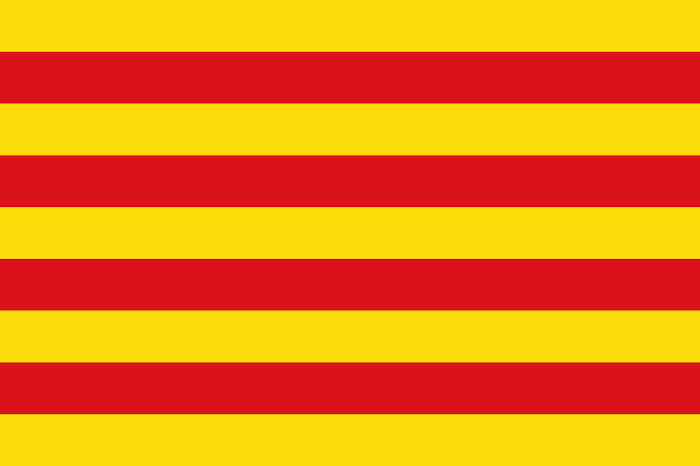to the 1989 Baltic Chain (also Baltic Way) of 2 million people stretching 600 kilometers from Tallinn through Riga to Vilnius that caught the attention of the world.
The Latvian prime minister and Lithuanian president immediately drew direct parallels between Catalonian aspirations and those of the Baltic States during the Soviet occupation. A little sober afterthought had both Latvians and Lithuanians saying that there are wide distinctions between Spain and the Soviet Union, the most obvious one being the difference between a totalitarian and democratic state.
One must note that in making a comparison, the constitution of the Soviet Union actually saw a possibility of a Soviet Socialist Republic seceding from the USSR, while the Spanish constitution does not offer this option as a possibility – an anomalous twist in one's expectations.
While these two opposing constitutional positions seem to be give Moscow a progressive and Madrid a reactionary approach, reality indicates otherwise. Anyone proposing independence for the Baltic states or for any other SSR would feel the full weight of the Kremlin's repression, even if the constitution were quoted by the independence seekers as a lawful and legitimate source of political guidance. In sharp contrast is the situation for independence-seeking Catalans. Madrid has not made any effort to repress freedom of expression and speech as manifested in the Catalonian self-determination pursuit. The Spanish government is against confrontation and is seeking dialogue as a way to reach an acceptable solution.
In 1989, as the Baltic Chain elicited world-wide sympathy and in spite of Western support for the non-recognition de jure of the annexation of the Baltic states, official unconditional governmental support for full Baltic sovereignty was not forthcoming, Iceland being the lone exception. The word of the day from Western capitals was to encourage a peaceful dialogue between the Balts and Moscow. (Here one cannot forget the desperation with which the Baltic governments sought non-existent Western support during the imminent Soviet takeover of their countries in 1940.)
One is regrettably reminded of the performance of Finnish prime minister Mauno Koivisto who openly opposed independence for the Baltic states. “We of course will not intrude in the internal affairs of the Soviet Union. Finland has de facto recognized the Baltic states as part of the Soviet Union.” Twelve years later in 2001 Koivisto claimed that any criticism of the Soviet Union at the time would not have had any effect. “I think the Finnish people understand this very
well. The general understanding is to avoid situations with which we cannot cope.” But it is still the general belief that Finns in their heart support the underdog.
It's expected that the European Union will do anything to avoid a problem. EU commissioner Joaquin Almunia, a Basque Spanish politician has indicated that an independent Catalonia would be expelled from the EU. In the early fall Spanish foreign minister Jose Manual Garcia-Margallo warned that Catalonia would have to “bid farewell to the European Union” if it went ahead with the independence vote.
Striving for self-determination is a wide range of nationalities, some in established democracies and in repressive and indeterminate political systems, nationalities such as the Kurds, Chechens, Scots, Palestinians, Basques, Tibetans etc. How one recognizes their legitimacy and designates their activists depends one's own proclivities. Thus they are variously labelled as terrorists, separatists, extremists, resistance fighters, freedom fighters, nationalists, rebels etc.
Kiho fully advocates support for the peaceful aspirations of the Catalans for independence. He insists that the democratic right of self-determination cannot be denied to a distinct nationality whose vast majority indicates this via a vote. In addition he also rejects the EU's intention of denying membership to an independent Catalonia, since a basis for the EU's existence is freedom and democracy.
In 2009 and 2010 unofficial referendums were held in many towns of Catalonia which resulted in an overwhelming support for independence. It must be noted that participation was low. In 2012 dozens of Catalan towns declared themselves Free Catalan Territory stating that “Spanish legislation and regulations have effect only in Spain. Also a resolution calling for a referendum was passed by the Parliament of Catalonia in 2012.
Catalonia's population of 7.5 million people has been impacted mildly by European's recession whew compared to other parts of Spain and has shown a steadily growing independence mood from Madrid. Catalans complain that that their region's contribution is disproportionate with too much money flowing into the central government's coffers and little sent back in return, paying some $15 million (US) more than it receives. Catalonia, unlike the Basque region with its similar goals for secession, is Spain's economically most powerful region. But due to the economic crisis is currently the most indebted to Madrid. These and other problems have caused such a breakdown in relations with Spain's central government that the only solution is a referendum says the Catalan leadership.
While Estonians may fully sympathize with Catalonia's aspirations, arguments for and against independence seem to be equally compelling: Catalans are part of a distinct, proud nation with its own language, history, culture and flag. They have survived Franco's attempt to suppress their language and supporters of independence insist that their language is not sufficiently respected by the central government. Unless something is done their culture will be absorbed.
Against this is the risk of opening up Pandora's box if Catalonia gains independence. Nationalists in other parts of Europe are also clamouring for the same. Europe could end up in a mosaic of squabbiling ever-diminishing micro-states which could create a dangerous potential for conflict. Catalans undeniably have their own distinct culture, but they also have much in common with the rest of Spain.
The arguments supporting and opposing independence for Catalonia are numerous. Estonians will have to line up their pro and con priorities to make an intelligent decision.
Laas Leivat




